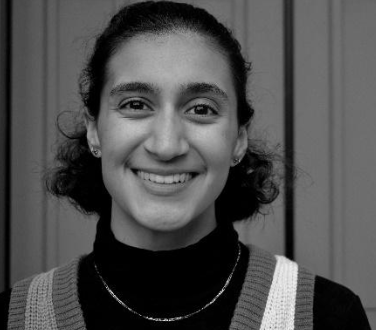Culture May 2, 2023


“I’m here.”
Patty’s shoulder cradles the phone as she readjusts her backpack. Students mill around. Metal lockers squeak open, and slam shut. The grating ring of a bell spurs the teenagers into reluctant action.
“Why do I have to do this?” she asks. There’s a pause. She sighs.
“Laesh?” she rephrases in Arabic. A girl eyes Patty, walking past.
“I want you to call me, when you leave for school, when you arrive. I need to know where you are.” Her father’s commanding voice pours into her ear. She can imagine him on the other end, putting up his hand, halting any further argument.
Patty doesn’t remind her father that her three brothers don’t get the same treatment, can come and go as they please, and are allowed to respond in English; she knows how to adapt and thrive.
She nods, hanging up. “Nam. Bye, Baba.”
In her father’s strict Arab household, there is no dating, no staying out late. No sleepovers. While she cheerleads at football games, her father sends her brothers to look after her, to protect her. He holds her tight.
Six years prior, she arrived in the San Fernando Valley alone: a third-grader with a student visa, two thousand miles from home.
Patty was born in Honduras, in the Saadeh family’s compound, where bedrooms and guest suites sprout beneath the fronds of tropical gardens. They lived in Tegucigalpa, where the land was vast and filled with immigrants from Bethlehem, a thriving Arab-Palestinian community.
Life in Honduras was dangerous between the wealth disparity, gang activity, and kidnappings. So Patty was sent to southern California to live with her loving grandmother and two nightmarish aunts, nicknamed the Gruesome Twosome. (They were miserable–one, a religious fanatic, and the other, a hardened manipulator.) Patty learned to live by Queen Elizabeth’s words, don’t complain, don’t explain.
In her new two-bedroom home in suburban Van Nuys, she tried not to think about her brothers or the country club their mom would take them to. She had new experiences to occupy herself: the Finnish twin girls across the street, their extensive Barbie collection, and their dizzying sauna.
For the first three months, she would stand outside her grandmother’s bedroom door at midnight, sniffling.
“Habibti,” her grandmother would lift the blanket, pulling her into the bed. She wiped Patty’s tears and held her close.
School was something to look forward to, and Patty was welcomed with open arms. Immersed in English classes, she became fluent after just a few months. She found a love for political science and history. She loved striking up academic arguments with teachers, earning top grades.
During summer break, she reunited with her family in Honduras. Her mother commented on her American accent, and they laughed about how she made her own bed rather than let the maids do it. By the end of the summer, she picked up life as though she’d never left.
“Don’t leave, please. Take me with you,” her brother, Jeffery, cried into her shoulder.
They sat together on the edge of his bed, holding onto each other. It was never easy to say goodbye to her best friends.
In Van Nuys, she was the token Arab in a sea of mostly white peers. The only Palestinian. And Mr. Massey, the history teacher, took note when screening gruesome films about Nazi Germany and the Holocaust. Without fail, Mr. Massey would single Patty out, making her sit in the front row.
In 1972, her father and brothers planned to join her in California, permanently. Her mother would not be coming. After several years of marriage to a very passionate man–in anger and love–her mother had had enough. Patty’s father, with powerful connections, won custody of the children and sent Patty’s mother to live in Chicago. Patty didn’t have any contact with her mother until after he died, more than seven years later.
When Patty was sixteen, her father arranged for her to marry a 27-year-old American-Palestinian man. At dinner after her seventeenth birthday, he suggested it was time to set a date. She went silent. Once she got home, she retreated into her father’s back office.
“What’s wrong, habibti?” Her father knocked on the door.
“I can’t do it. I will not get married. I can’t do it–I’ll kill myself.” she broke down.
She looked down at her left hand, at the ring that had glittered so maturely. She begrudgingly wedged it off her finger.
She was only a kid. Despite her father’s strict appearance, she was the apple of his eye; on most days, she could get away with murder. So, her father went back outside and began the first of many apologies to the family.
A little more than a year later, her father sent her to Palestine with a list of men from which to choose, and so Patty set out on her next adventure: a consensual arranged marriage.
To this, she says, it is what it is.
Years later, Patty continues to adapt to her environment and thrive, taking over her late husband’s auto repair shop or purchasing a house in Spain. She welcomes each of life’s complications as an adventure with loose reins, waiting to be steered.
About Maya Salem: Maya Salem, currently studying at the College of Creative Studies at the University of California, Santa Barbara, is a storyteller. Informed by musicality, family roots, and cognitive psychology, her work is best described as interdisciplinary. When she’s not scavenging for empty beaches and free time, she’s probably busy. She has been published in The Daily Nexus, ENTITY magazine, Green Blotter, and has been distinguished for her poetry in the College of Creative Studies, as well as the Mission Viejo Art Collaborative.

About Stories Matter: A mentoring program founded by writer Leslie Zemeckis, and co-sponsored by the SBIFF and ENTITY Magazine, for young female writers, nurturing and inspiring the next generation of writers to tell their stories. A weekly intensive with published female author’s giving their time to encourage greatness and share their writing process. The theme was “A Woman You Should Know.” These stories are the best of the bunch, some remain works-in-progress, some will (hopefully) take these stories and turn them into longer pieces.